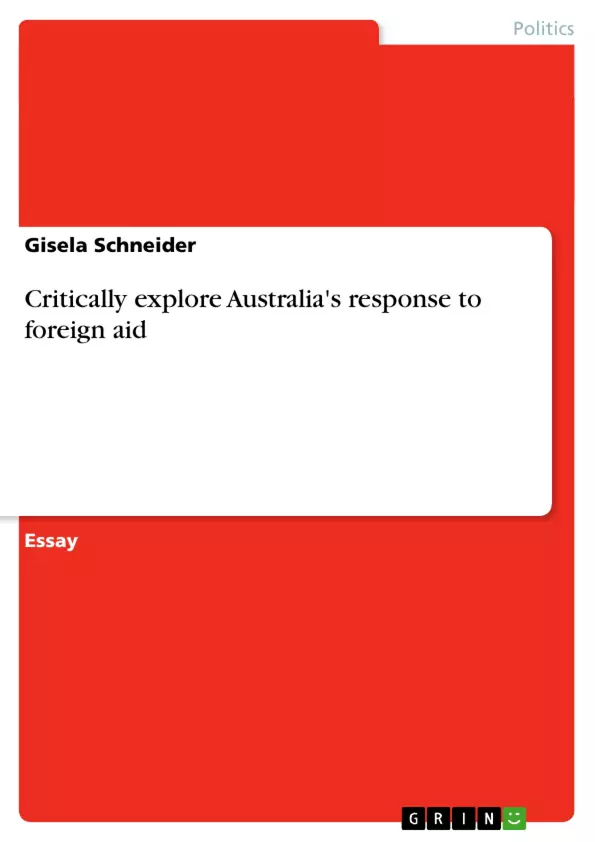In an era of globalisation, the gap between rich and poor is growing. Mass poverty is still one of the most important economic and social problems. To reduce the existing inequalities, economic assistance of the richer countries is needed. This procedure is often part of the foreign policy of a country’s government and is called foreign aid or also official development assistance (ODA). It comes in a variety of forms like grants, loans, export credits or technical and military assistance and can be used for a variety of purposes.
In June 1992, the world’s richest countries, including Australia, recognized at the Earth Summit in Rio that “poverty alleviation was crucial to global sustainable development” and therefore “reaffirmed their commitment to the United Nations (UN) [aid] target of 0.7 per cent Gross National Product (GNP)”.
While the world’s richest countries steadily increase their wealth, aid to developing countries however declines. In 2000, the average of given aid was at about 0.24 per cent GNP whereat only Denmark, the Netherlands, Norway and Sweden met the UN target. One of the reasons for this development is certainly the fact that aid is rather used for economic purposes than devoted to the ethical and selfless commitment for direct poverty reduction in countries which need the money most. This fact and the incorrect allocation may be the reason that over the past fifty years the sum of $1 trillion in aid given to poor countries has mostly failed.
The purpose of this essay is to demonstrate the difference between what is actually happening and what, in my opinion, should be happening concerning Australia’s response to foreign aid. As said, Australia’s aid budget is not meeting the UN target. From a moral point of view, the country’s government therefore should spend a higher amount for development purposes, reallocate the distribution of aid and follow a framework of ethical principles. I will fortify this thesis with an overview of the countries past and actual approaches to development assistance programs, which are mainly shaped by a realistic mentality and therefore are seen as controversial. I will further focus on the countries biggest moral dilemma, the fact of the inseparability of human rights and economic interest which has essential influence on their distribution of aid. This is also connected to controversial debates raised in the national and international context, which will be evaluated under an ethical point of view.
Inhaltsverzeichnis (Table of Contents)
- Introduction
- Critical evaluation of Australia's response to foreign aid
- Conclusion
Zielsetzung und Themenschwerpunkte (Objectives and Key Themes)
This essay aims to analyze the evolution and effectiveness of Australia's foreign aid program, highlighting the discrepancies between stated goals and actual practices. It will examine how Australia's approach to development assistance has been shaped by a combination of political, economic, and ethical considerations.
- The historical evolution of Australia's foreign aid program
- The interplay between political and humanitarian motives in aid distribution
- The impact of Australia's aid program on recipient countries
- The role of human rights and economic interests in shaping aid allocation
- The ethical considerations and controversies surrounding Australia's foreign aid policies
Zusammenfassung der Kapitel (Chapter Summaries)
The introduction outlines the growing gap between rich and poor nations and the need for foreign aid. It emphasizes the ethical obligation of wealthier countries to assist developing nations, citing the UN target of 0.7% of Gross National Product (GNP) for aid allocation. The introduction also raises concerns about the effectiveness of aid programs, particularly in achieving poverty reduction.
The second chapter, “Critical Evaluation of Australia's Response to Foreign Aid,” delves into the history and evolution of Australia's aid program. It examines the factors influencing Australia's approach to development assistance, particularly the geopolitical considerations surrounding its relationships with neighboring Asian countries. The chapter traces Australia's involvement in initiatives such as the Colombo Plan, highlighting the evolving balance between political and humanitarian objectives in its aid programs.
Schlüsselwörter (Keywords)
Australia's foreign aid, development assistance, Colombo Plan, geopolitical considerations, humanitarian aid, economic cooperation, human rights, ethical concerns, poverty reduction, recipient countries, aid allocation.
Frequently Asked Questions
What is Australia's target for foreign aid?
Like other rich countries, Australia committed to the United Nations target of 0.7% of its Gross National Product (GNP) for official development assistance (ODA).
Does Australia meet the UN aid target?
No, the essay highlights that Australia's aid budget consistently falls short of the 0.7% target, raising ethical questions about its commitment to global poverty reduction.
What is the "Colombo Plan"?
The Colombo Plan was a regional initiative in which Australia participated, blending political objectives in Asia with humanitarian and technical assistance.
How are human rights and economic interests linked in Australian aid?
The paper discusses a "moral dilemma" where aid allocation is often influenced by geopolitical and economic interests rather than purely ethical principles or direct poverty reduction.
Why has a lot of foreign aid failed in the past?
The essay suggests that incorrect allocation and using aid for economic purposes of the donor country instead of selfless poverty reduction are major reasons for the failure of aid programs.
- Citar trabajo
- Gisela Schneider (Autor), 2002, Critically explore Australia's response to foreign aid, Múnich, GRIN Verlag, https://www.grin.com/document/14897



